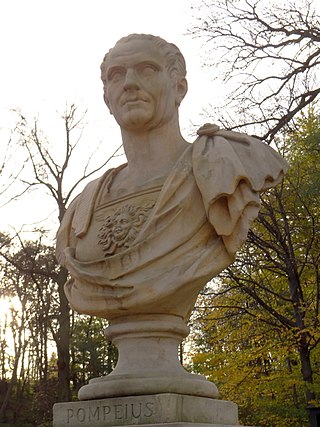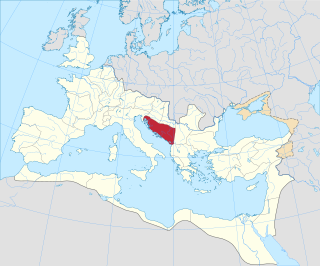Related Research Articles
This article concerns the period 29 BC – 20 BC.

The gens Petronia was a plebeian family at ancient Rome. This gens claimed an ancient lineage, as a Petronius Sabinus is mentioned in the time of Lucius Tarquinius Superbus, the last of the Roman kings, but few Petronii are mentioned in the time of the Republic. They are frequently encountered under the Empire, holding numerous consulships, and eventually obtaining the Empire itself during the brief reign of Petronius Maximus in AD 455.

The gens Licinia was a celebrated plebeian family at ancient Rome, which appears from the earliest days of the Republic until imperial times, and which eventually obtained the imperial dignity. The first of the gens to obtain the consulship was Gaius Licinius Calvus Stolo, who, as tribune of the plebs from 376 to 367 BC, prevented the election of any of the annual magistrates, until the patricians acquiesced to the passage of the lex Licinia Sextia, or Licinian Rogations. This law, named for Licinius and his colleague, Lucius Sextius, opened the consulship for the first time to the plebeians. Licinius himself was subsequently elected consul in 364 and 361 BC, and from this time, the Licinii became one of the most illustrious gentes in the Republic.

The gens Pompeia was a plebeian family at ancient Rome, first appearing in history during the second century BC, and frequently occupying the highest offices of the Roman state from then until imperial times. The first of the Pompeii to obtain the consulship was Quintus Pompeius in 141 BC, but by far the most illustrious of the gens was Gnaeus Pompeius, surnamed Magnus, a distinguished general under the dictator Sulla, who became a member of the First Triumvirate, together with Caesar and Crassus. After the death of Crassus, the rivalry between Caesar and Pompeius led to the Civil War, one of the defining events of the final years of the Roman Republic.
Lucius Seius Strabo was a prefect of the Roman imperial bodyguard, known as the Praetorian Guard, during the rule of the emperors Augustus and Tiberius. The length of Strabo's tenure as Praetorian prefect is unknown, but he held the position together with various colleagues until 15, after which he was appointed to the governorship of Egypt. With this career Strabo distinguished himself by attaining the two highest offices open to men of the equestrian class in the Roman Empire.
The gens Terentia was a plebeian family at ancient Rome. Dionysius mentions a Gaius Terentius Arsa, tribune of the plebs in 462 BC, but Livy calls him Terentilius, and from inscriptions this would seem to be a separate gens. No other Terentii appear in history until the time of the Second Punic War. Gaius Terentius Varro, one of the Roman commanders at the Battle of Cannae in 216 BC, was the first to hold the consulship. Members of this family are found as late as the third century AD.

Lucius Sestius Albanianus Quirinalis was an aristocrat of the late Roman Republic. Although having Republican tendencies, Augustus appointed him suffect consul in 23 BC to fill his role.

Dalmatia was a Roman province. Its name is derived from the name of an Illyrian tribe called the Dalmatae, which lived in the central area of the eastern coast of the Adriatic Sea. It encompassed the northern part of present-day Albania, much of Croatia, Bosnia and Herzegovina, Montenegro, Kosovo and Serbia, thus covering an area significantly larger than the current Croatian region of Dalmatia. Originally this region was called Illyria or Illyricum.
The Salassi or Salasses were a Gallic or Ligurian tribe dwelling in the upper valley of the Dora Baltea river, near present-day Aosta, during the Iron Age and the Roman period.

The wars of Augustus are the military campaigns undertaken by the Roman government during the sole rule of the founder-emperor Augustus. This was a period of 45 years when almost every year saw major campaigning, in some cases on a scale comparable to the Second Punic War, when Roman manpower resources were stretched to the limit. This period also saw expansion through diplomacy and annexation, without the direct use of military force. The result was a major expansion of the empire that Augustus inherited from the Roman Republic, although the attempted conquest of Germania ended in defeat despite the enormous deployment of resources involved. As a result of these campaigns, the Roman Empire assumed the borders it would hold, with a few modifications, for its entire history.
The gens Septimia was a minor plebeian family at ancient Rome. The gens first appears in history towards the close of the Republic, and they did not achieve much importance until the latter half of the second century, when Lucius Septimius Severus obtained the imperial dignity.
Lucius Licinius Varro Murena was a Roman politician who was accused of conspiring against the emperor Augustus, and executed without a trial.
Gnaeus Calpurnius Piso was a high ranking Roman aristocrat and senator. He was firmly traditionalist and opposed the populist First Triumvirate, and later Julius Caesar. He fought against Caesar in the Caesar's civil war and against his adopted son, Octavian, in the Liberators' civil war; both times on the losing side.
The gens Fannia was a plebeian family at ancient Rome, which first appears in history during the second century BC. The first member of this gens to attain the consulship was Gaius Fannius Strabo, in 161 BC.
The Terentii Varrones a branch of the gens Terentia in ancient Rome.

The gens Fundania was a plebeian family at Ancient Rome, which first appears in history in the second half of the third century BC. Although members of this gens occur well into imperial times, and Gaius Fundanius Fundulus obtained the consulship in BC 243, the Fundanii were never amongst the more important families of the Roman state.

The gens Juventia, occasionally written Jubentia, was an ancient plebeian family at Rome. After centuries of obscurity, the gens emerges into history with the appearance of Titus Juventius, a military tribune, in the beginning of the second century BC. The first of the Juventii to obtain the consulship was Marcus Juventius Thalna in 163 BC. But the family is renowned less for its statesmen than for its jurists, who flourished during the second century AD.

The gens Nonia was a plebeian family at ancient Rome. Its members first appear in history toward the end of the Republic. The first of the Nonii to obtain the consulship was Lucius Nonius Asprenas in 36 BC. From then until the end of the fourth century, they regularly held the highest offices of the Roman state.
The gens Seia was a minor plebeian family of equestrian rank at ancient Rome. Members of this gens are first mentioned in the time of Cicero, and a few of them held various magistracies under the late Republic and into imperial times.
The gens Silia was a plebeian family at ancient Rome. Members of this gens are mentioned as early as the fifth century BC, but first to hold the consulship was Publius Silius Nerva, in the time of Augustus. The Silii remained prominent until the time of the Severan dynasty, in the early third century.
References
- ↑ Smith's Biography Murena
- ↑ Wells, pg. 53
- ↑ Lightman, A to Z of ancient Greek and Roman women, pg. 312
- ↑ Syme, pg. 358
- ↑ Davies, pg. 257
- ↑ Dio 53.25
- ↑ Strabo IV.6.7; Davies, pg. 257
- ↑ Swan, pg. 240
- ↑ Raaflaub, pg. 426
- ↑ Clifford Ando, Imperial ideology and provincial loyalty in the Roman Empire, pg. 140 140